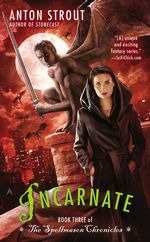 Incarnate
Incarnate
by Anton Strout
Mass Market Paperback, 320 pg.
Ace, 2014
Read: October 11 – 15, 2014
 And here we are at the end of The Spellmason Chronicles (following Alchemystic and Stonecast). So the big question for me going into this (aside from how would Lexis and Stanis clean up that mess from Stonecast?) was: could Strout stick the landing — his other series was just canceled, leaving things open (and I’m still curious about it), this was a planned conclusion, so how’d he manage it? I’m not at all surprised to say, pretty well.
And here we are at the end of The Spellmason Chronicles (following Alchemystic and Stonecast). So the big question for me going into this (aside from how would Lexis and Stanis clean up that mess from Stonecast?) was: could Strout stick the landing — his other series was just canceled, leaving things open (and I’m still curious about it), this was a planned conclusion, so how’d he manage it? I’m not at all surprised to say, pretty well.
First off, Strout really expands his world here — there’s a lot more magic, magic users and the like than he’d shown before (it was there before, but we hadn’t seen it as much). There’s some new characters I’d like to spend more time with — Fletcher seems really interesting, and the NYPD detectives Maron and Rowland need to run into Simon Canderous and Connor Christos.
Lexi’s a lot more confident in her abilities — which have grown since we saw her last — and driven in a very Peter Parker-y way. She’s a lot more than the would-be artist we meant a couple of books ago. Similarly, her pals Rory and Marshall have grown a good deal — I like the development of them both. Marshall’s is on the one hand surprising (as Lexi’s and Rory’s reactions attest), but on the other is a lot more believable than Rory’s. But with Rory, her continued growth into Lexi’s go-to fighter is pretty fun, and as long as we’re buying the whole Spellmason thing, we might as well buy into Rory the super-hero.
Stanis has his hands full trying to track down stray grotesques like himself, help them understand what’s going on with them and give them a place of safety and refuge — particularly as the threat of a group of grotesques who are out to use their strength, abilities and invulnerabilities against humanity. The more we learn about the leader of the other group, the worse it gets. I don’t want to get into spoilers here, but the Big Bad in Incarnate here is probably the worst villain that Strout’s come up with yet.
Throw in interference from the magic community (who aren’t happy at all that muggles are seeing flying statues in the Big Apple), notice of — and pursuit by — the NYPD, and Lexi and her gang have more than their hands full. Which makes for a good time for the readers.
That said, Strout stumbles a couple times with this. In the opening chapters, the dialogue is a little stilted, a little awkward. Which is really unusual — this is typically Strout’s strong point. But to me, a lot of the dialogue was very thinly veiled exposition. Not quite as bad as, “Hey Rory, my blue-haired best friend since childhood, dance student and resident ass-kicker, could you please pass me my great-great-great-grandfather’s spell book, the one I just inherited a couple of months ago when I started manifesting the abilities of a Spellmason?” But it felt close. By chapter 4 or 5, that mostly disappears, and if not for the notes I’d taken I’d probably have forgotten it.
There was a lot more blood than I expected here — not that this was really gory at all, and all of the nasty stuff happened off-screen (if you will), and our heroes either came across it after the fact or in photographs. So there’s a lot of blood and some dismemberment — but even the more squeamish readers should have no problem with it.
And, like Stonecast, this is a little too short. I could’ve used more Rory and Marshall (together or on their own). We hit the big “Boss Battle” a bit abruptly, I thought. Also, the last chapter is rushed. It felt like one of the alternate endings to Wayne’s World (there’s a relevant pop culture reference, for ya) — a series of conclusions for each character one after the other, bam, bam, bam. Given everything he tried to accomplish in those last few pages, the importance and scope involved, I just think it could’ve used a bit more breathing room.
I realize my negatives are longer than my positives — but that’s because I can talk about them with a bit more detail than all the cool stuff that happens, which pretty much involves spoilers. The good far outweighs the nits I may want to pick. All things considered, it’s a solid conclusion to a pretty good series. Good character development throughout, leaving most of the characters in places that will please and satisfy fans (I, honestly, would’ve preferred something a little less happy and a little more incarceration-y for Caleb). I don’t know if Strout has plans in this direction, but he leaves things in a place that he could come back and tell more stories in this world, and with these characters with no problem. Or he could leave them alone with no problem. Which is a nice place to leave a series.
Whatever Strout has planned next, I’m looking forward to it.
—–


